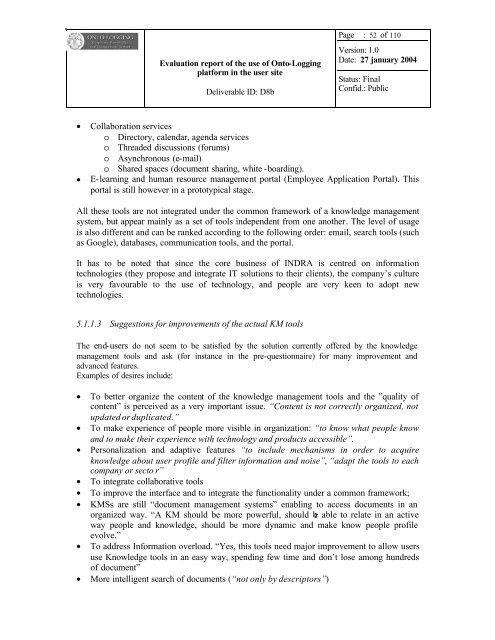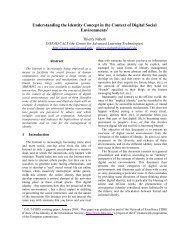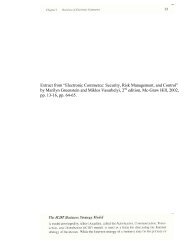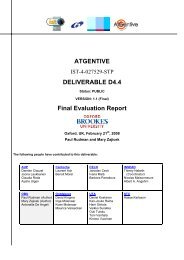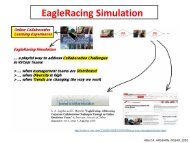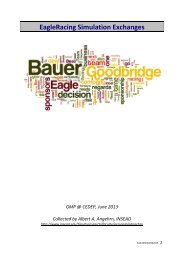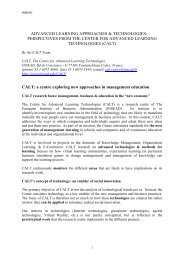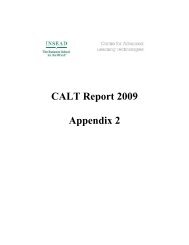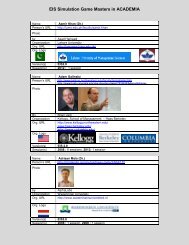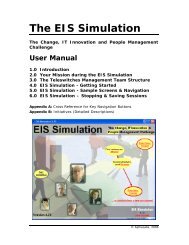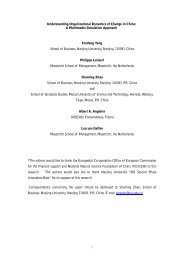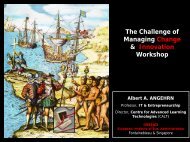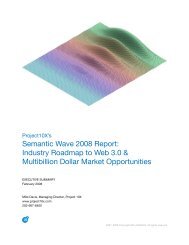pdf 820Kb - INSEAD CALT
pdf 820Kb - INSEAD CALT
pdf 820Kb - INSEAD CALT
You also want an ePaper? Increase the reach of your titles
YUMPU automatically turns print PDFs into web optimized ePapers that Google loves.
Evaluation report of the use of Onto-Logging<br />
platform in the user site<br />
Deliverable ID: D8b<br />
Page : 52 of 110<br />
Version: 1.0<br />
Date: 27 january 2004<br />
Status: Final<br />
Confid.: Public<br />
• Collaboration services<br />
o Directory, calendar, agenda services<br />
o Threaded discussions (forums)<br />
o Asynchronous (e-mail)<br />
o Shared spaces (document sharing, white -boarding).<br />
• E-learning and human resource management portal (Employee Application Portal). This<br />
portal is still however in a prototypical stage.<br />
All these tools are not integrated under the common framework of a knowledge management<br />
system, but appear mainly as a set of tools independent from one another. The level of usage<br />
is also different and can be ranked according to the following order: email, search tools (such<br />
as Google), databases, communication tools, and the portal.<br />
It has to be noted that since the core business of INDRA is centred on information<br />
technologies (they propose and integrate IT solutions to their clients), the company’s culture<br />
is very favourable to the use of technology, and people are very keen to adopt new<br />
technologies.<br />
5.1.1.3 Suggestions for improvements of the actual KM tools<br />
The end-users do not seem to be satisfied by the solution currently offered by the knowledge<br />
management tools and ask (for instance in the pre-questionnaire) for many improvement and<br />
advanced features.<br />
Examples of desires include:<br />
• To better organize the content of the knowledge management tools and the ”quality of<br />
content” is perceived as a very important issue. “Content is not correctly organized, not<br />
updated or duplicated.”<br />
• To make experience of people more visible in organization: “to know what people know<br />
and to make their experience with technology and products accessible”.<br />
• Personalization and adaptive features “to include mechanisms in order to acquire<br />
knowledge about user profile and filter information and noise”, “adapt the tools to each<br />
company or secto r”<br />
• To integrate collaborative tools<br />
• To improve the interface and to integrate the functionality under a common framework;<br />
• KMSs are still “document management systems” enabling to access documents in an<br />
organized way. “A KM should be more powerful, should be able to relate in an active<br />
way people and knowledge, should be more dynamic and make know people profile<br />
evolve.”<br />
• To address Information overload. “Yes, this tools need major improvement to allow users<br />
use Knowledge tools in an easy way, spending few time and don’t lose among hundreds<br />
of document”<br />
• More intelligent search of documents (“not only by descriptors”)


